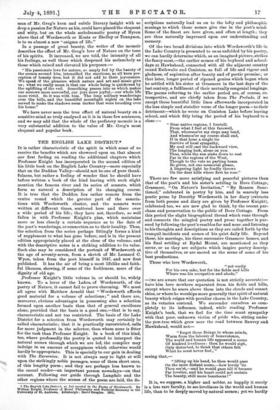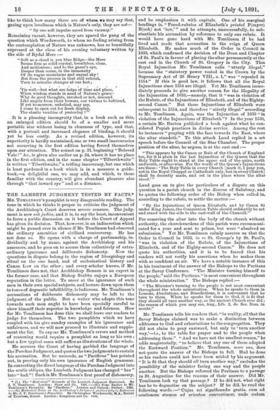THE ENGLISH LAKE DISTRICT.*
IT is rather characteristic of the spirit in which some of us receive the benefits which are showered upon us, that almost our first feeling on reading the additional chapters which Professor Knight has incorporated in the second edition of his little book on the English Lake Country—more especially that on the Duddon Valley—should not be one of pure thank- fulness, but rather a feeling of wonder that he should have before written a book of the kind leaving with such slight mention the famous river and its series of sonnets, which form so natural a description of its changing course. It is true that the Duddon lies rather remote from the centre round which the greiter part of the associa- tions with Wordsworth cluster, and the sonnets were written at different times, scattered here and there over a wide period of his life ; they have not, therefore, so well fallen in with Professor Knight's plan, which maintains more or less closely a certain sequence as to the date of the poet's wanderings, or connection as to their locality. Thus, the selection from the series perhaps fittingly forms a kind of supplement to what has gone before, and is in the present edition appropriately placed at the close of the volume, and with the descriptive notes is a striking addition to its value. Such also may be considered the portrait of Wordsworth at the age of seventy-seven, from a sketch of Mr. Leonard C. Wyon, taken from the poet himself in 1847, and now first published. It has the air of being a most lifelike and faith- ful likeness, showing, if some of the feebleness, more of the dignity of old age.
„Professor Knight's little volume is, or should be, widely known. To a lover of the Lakes, of Wordsworth, of the poetry of Nature, it cannot fail to prove charming. We must all agree with Matthew Arnold that " Wordsworth affords good material for a volume of selections ; " and there are, moreover, obvious advantages in possessing also a selection formed upon another basis than that of general excellence alone, provided that the basis is a good one,—that is to say, characteristic and not too restricted. The basis of the Lake District for a selection from Wordsworth may certainly be called characteristic; that it is practically unrestricted, calls for more judgment in the selector, than whom none is fitter for the task than Professor Knight. In a book of this kind, too, where professedly the poetry is quoted to interpret the natural scenes through which we are led, the compiler may indulge in an amount of scrappiness which otherwise would hardly be appropriate. This is specially to our gain in dealing with The Excursion. It is not always easy to light at will upon the strikingly noble passages, some of them short ones, of this lengthy -poem ; and they are perhaps less known to the casual reader—an important person nowadays—on that account. Following our guide through Langdale and the other regions where the scenes of the poem are laid, the de- • The English Lake District, os Int. rpreted in. the Poems of Wordsworth. By William Knight, Professor of Moral Philosophy and Political Economy in the University of St. Andrews. Edinburgh : David Douglas. 1891.
scriptions naturally lead us on to the lofty and philosophic musings to which those scenes give rise in the poet's mind- Some of the finest are here given, and often at length ; they are thus naturally impressed upon our understanding and memory.
Of the two broad divisions into which Wordsworth's life in the Lake Country is presented to us as unfolded by his poetry, we can hardly determine which, as an imagined picture, strikes the fancy most,—the earlier scenes of his boyhood and school- days at Hawkshead, connected with all the adjacent country round Esthwaite and Coniston, so full of life and vigour and gladness, of aspiration after beauty and of poetic promise ; or that later, longer period of ripened genius which began when he settled with his sister at Grasmere in the last days of the
last century, a fulfilment of their mutually congenial longings. The poems referring to the earlier period are, of course, re- trospective, and are chiefly taken from The Prelude, if we
except those beautiful little lines afterwards incorporated in the less simple and statelier verse of the longer poem—to their detriment—which he wrote on Coniston Lake before leaving school, and which fitly bring the period of his boyhood to a.
close :— " Dear native regions, I foretell, From what I feel at this farewell, That, wheresoe'er my steps may tend, And whensoe'er my course shall end, If in that hour a single tie Survive of local sympathy, My soul will cast the backward view, The longing look, alone on you. Thus, while the sun sinks down to rest Far in the regions of the West, Though to the vale no parting beam Be given, not one memorial gleam, A lingering light he fondly throws On the dear hills where first he rose."
There are few more satisfying and peaceful pictures than that of the poet's and his sister's settling in Dove Cottage, Grasmere, " On Nature's Invitation," " By Reason Sanc- tioned," celebrated in poetry by him, and in scarcely less poetic prose by Dorothy Wordsworth in her diary (extracts. from both poems and diary are given by Professor Knight), celebrated too, we are now glad to think, by the recent pur- chase and preservation to the public of Dove Cottage. From this period the slight biographical thread which runs through and connects the mingled poetry and prose together is pur- sued by following the poet's rambles far and near, and listening to his thoughts and descriptions as they are called forth by the- tranquil incidents and scenes of his quiet daily life. Beyond_ these, his marriage, his three successive Grasmere homes, and his final settling at Rydal Mount, are mentioned as they occur, or as they are subjects which inspire poetry descrip- tive of themselves, or are sacred as the scene of some of his. best productions.
Those who love Wordsworth, " not verily
For his own sake, but for the fields and hills Where was his occupation and abode," —(we are aware that our quotation is not strictly accurate)— have him here nowhere separated from his fields and hills,
except where he soars above them into the clouds and sunset skies, or where he worships more generally that spirit of natural beauty which reigns with peculiar charm in the Lake Country, as its votaries contend. We surrender ourselves so com- pletely to its influence, indeed, while reading Professor Knight's book, that we feel for the time scant sympathy with that poor, unknown victim of pride who, sitting under- the yew-tree which grew near the road between Sawrey and
Hawkshead, would not— "forget those Beings to whose minds, Warm from the labours of benevolence, The world and human life appeared a scene Of kindred loveliness : then he would sigh, Only disturbed, to think that others felt What he must never feel ; " seeing that,— "lifting up his head, he then would gaze On the more distant scene,—how lovely 'tis Thou see'st,—and he would gaze till it became Far lovelier, and his heart could not sustain The beauty, still more beauteous !"
It is, we suppose, a higher and nobler, as happily it surely is a less rare faculty, to see loveliness in the world and human
life, than to be deeply moved by natural scenes; yet we hardly
like to think how many there are of whom we may say that gazing upon loveliness which is Nature's only, they are not- ." By one soft impulse saved from vacancy." Remaining vacant, however, they are spared the pang of the question which Wordsworth, to whom no feeling arising from
the contemplation of Nature was unknown, has so beautifully expressed at the close of his evening voluntary written by the side of Rydal Mere :—
"Soft as a cloud is yon blue Ridge—the Mere seems firm as solid crystal, breathless, clear, And motionless ; and to the gazer's eye, Deeper than ocean, in the immensity Of its vague mountains and unreal sky ! But from the process in that still retreat, Turn to minuter changes at our feet; 'Tis well—but what are helps of time and place, When wisdom stands in need of Nature's grace : Why do good thoughts, invoked or not, descend Like angels from their bowers, our virtues to befriend,
If yet to-morrow, =belied, may say,
I come to open out for fresh display,
The elastic vanities of yesterday ? "
It is a pleasing incongruity that, in a book such as this, an enlarged edition should be of a smaller and more
portable size without losing in clearness of type, and that, with a portrait and increased elegance of binding, it should yet be less costly. As a revised edition, however, its superiority is hardly maintained, one or two small inaccuracies not occurring in the first edition having forced themselves
upon our attention. The sonnet on p. 31, beginning " Beloved Tale !" &c., is given also earlier on p. 24, where it has no place in the first edition, and in the same chapter " Tilberthwaite" is written " Tiberthwaite," a trifling inaccuracy, but one which is least pardoned in a book which is in a measure a guide- book,-'-a delightful one, we may add, and which, to those familiar with the country, will give abundant pleasure also through " that inward eye " and at a distance.











































 Previous page
Previous page